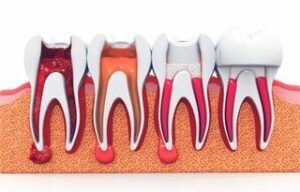
Teeth sensitivity is a common dental issue characterized by a sharp, sudden pain that often occurs when you eat or drink something cold, hot, or sweet. It can also be triggered by brushing or flossing your teeth. Teeth sensitivity occurs when the tooth enamel (the hard, outer layer of the tooth) is worn down or the gum line has receded, exposing the underlying dentin, which is more sensitive.
This sensation is often described as an electric shock or a sharp pain that lasts only a few seconds but can be debilitating for those who experience it frequently. In this article, we’ll explore the causes and treatments of tooth sensitivity.
Causes of Tooth Sensitivity
- Gum Recession: Gum recession is one of the leading causes of tooth sensitivity. When the gums recede, the tooth roots are exposed, making them sensitive to hot, cold, and sweet foods and drinks.
- Tooth Decay: Tooth decay can lead to the development of cavities, which can cause tooth sensitivity. When a cavity is deep enough, it can reach the inner layer of the tooth, which contains nerves and blood vessels, causing pain and sensitivity.
- Teeth Grinding: Grinding or clenching your teeth can cause enamel wear, which can lead to tooth sensitivity. Enamel is the hard, protective layer on the surface of the teeth that protects them from damage.
- Over Brushing: Over brushing can cause enamel wear and gum recession. Brushing your teeth too hard or using a toothbrush with hard bristles can cause this problem.
- Acidic Foods and Beverages: Acidic foods and beverages, such as citrus fruits, soda, and sports drinks, can erode tooth enamel, causing tooth sensitivity.
Treatments for Tooth Sensitivity
- Desensitizing Toothpaste: Desensitizing toothpaste can help reduce tooth sensitivity by blocking the pathways that lead to the nerves of the teeth. These toothpaste types contain potassium nitrate or strontium chloride.
- Fluoride Treatment: Fluoride treatment can help strengthen the enamel of the teeth, reducing tooth sensitivity. Fluoride is a mineral that helps to rebuild and strengthen tooth enamel.
- Dental Bonding: Dental bonding is a procedure in which a tooth-colored resin material is applied to the surface of the teeth. This procedure can help protect the tooth surface and reduce sensitivity.
- Gum Grafting: Gum grafting is a surgical procedure in which gum tissue is taken from another part of the mouth and grafted onto the affected area. This procedure can help cover the exposed tooth root, reducing sensitivity.
- Changing Habits: Changing certain habits, such as avoiding acidic foods and beverages, wearing a mouthguard to protect teeth from grinding, or using a soft-bristled toothbrush and gentle brushing technique, can help reduce tooth sensitivity.
Conclusion
Tooth sensitivity can be a frustrating and uncomfortable dental problem. Fortunately, there are several treatments available that can help reduce sensitivity and improve the overall health of your teeth. By taking good care of your teeth and gums and following the advice of your dentist, you can prevent and manage tooth sensitivity and enjoy a healthy, pain-free smile.
0 comments on “The Causes and Treatments of Tooth Sensitivity”